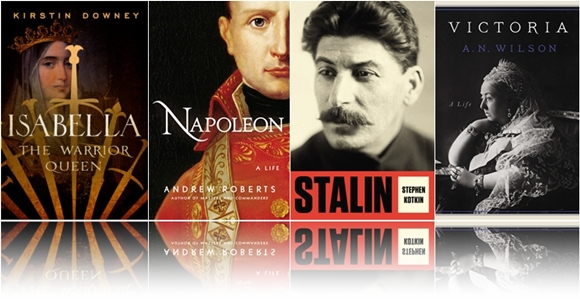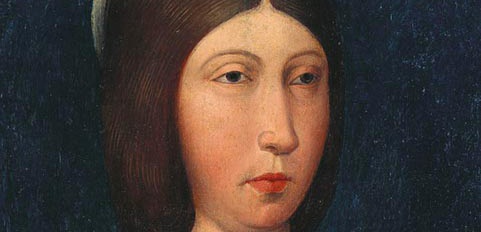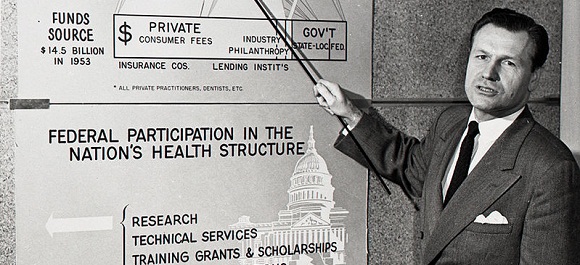From Stalin to Rockefeller: 5 Blockbusting Biographies This Fall
By Matt Staggs

Be prepared to make some space on your already groaning bookshelves, readers: We've got five enormous biographies on the radar, and any one of them alone could topple the mightiest of shelves (or if you prefer fitting one into a book bag, better try reinforcing it with steel rivets first.)
The least of these literary heavyweights clocks in at over 544 pages, and the largest at nearly a thousand, but we’re not complaining: a mere two or three hundred pages wouldn't even begin to address the history-making reign of Queen Isabella I of Castile, or the shrewd machinations and brutality of Soviet leader Josef Stalin. In fact, 976 pages is just the beginning of Steven Kotkin’s Stalin: Volume One: Paradoxes of Power, which covers just the years between 1878 and 1928!
While these whopper door-stoppers are huge, none of them are the biggest on the biographical block. That particular honor goes to Randolph Churchill's and Martin Gilbert’s official biography of Winston Churchill, which at eight primary books and sixteen companion volumes could qualify as a library in itself. The longest autobiography in the English language? My Secret Life, an eleven-volume 19th century erotic memoir written by an anonymous Victorian man.
But I digress. Let’s take a look at some of this fall’s heavy-hitting (and just plain heavy) biographies.

Isabella: The Warrior Queen by Kirstin Downey
Medieval Europe wasn't especially friendly to women, but even in this violent, rigidly patriarchal era, there were women who refused to bow to male authority. Isabella of Castile was one of them. Her brother, King Henry IV, saw in Isabella a potential threat to his leadership. He was on to something. After being deposed by his many enemies, Isabella assumed his place on the throne. She went on to crush Castile’s rampant crime, settle its debt, and fund Columbus’s journey to the New World. There was a dark side to Isabella’s reign, too: She started the Spanish Inquisition, and exiled her kingdom’s Jewish residents -- but not before relieving them of their valuables.
Interesting fact: Isabella may have shown very little mercy to her Jewish subjects, but her position on the native peoples of the New World was progressive for the time (much like the Spanish explorer Cabeza de Vaca). She claimed them as her subjects and forbade Columbus from enslaving them. Columbus disregarded her orders.

Napoleon: A Life by Andrew Roberts
Like Alexander the Great and Caesar Augustus before him, Napoleon Bonaparte conquered much of Europe through might of arms and capable leadership. In the process, this former artillery officer ensured his place among history’s most powerful warriors. That he was one of the world’s greatest military minds and an undeniably gifted statesmen is sealed in his series of conquests, but his motivation remains a matter of conjecture. What was behind this one-time emperor’s quest to conquer the world, and why is he still the subject of intense public fascination hundreds of years after his death?
Interesting fact: Like fellow dictators Saddam Hussein and Muammar Gaddafi, Napoleon dabbled in fiction. He was the author of Clisson et Eugénie, a semi-autobiographical romance novel.

On His Own Terms: A Life of Nelson Rockefeller by Richard Norton Smith
How do you make your mark in the world when you’re a member of one of America’s wealthiest, most accomplished families? For Nelson Rockefeller, there was only one answer: Become the president of the United States. He may have never become president, but Rockefeller’s political career was anything but a bust. During his four terms as governor of New York, Rockefeller outlawed discrimination in housing and employment, expanded the state’s park service, and invested heavily in higher education. Unfortunately, Rockefeller was a disaster when it came to issues of crime and punishment. His mismanagement of the Attica prison riot led to the deaths of thirty-nine people, and his drug policies paved the way for unreasonably harsh mandatory sentences, and New York City’s hotly criticized "stop and frisk" policy.
Interesting fact: Nelson’s son, Michael, disappeared in 1961 during a trip to New Guinea. Rumors abound that he may have fallen victim to a local tribe that still practiced ritual cannibalism.

Victoria: A Life by A.N. Smith
Queen Victoria was the longest reigning monarch of any kingdom in the history of the British Isles. During her nearly 64 years upon the throne, Victoria oversaw her nation’s transformation into an industrial and military powerhouse of unrivaled strength, an empire that sprawled across the entire world. Transformation was happening at home, too, as Victoria’s subjects worked to redefine their relationship with a largely symbolic monarchy. It was a unique time in British history, but Victoria was a unique woman: an unconventional soul whose reserved public image belied the passion and humor of her private life.
Interesting Fact: During her later years, Victoria gave the order that no one knock on her bedroom door. They were instructed to gently scratch, instead.

Stalin: Volume I: Paradoxes of Power, 1878-1928 by Stephen Kotkin
On the eve of the 20th century, a poor seminary student named Joseph Stalin abandoned his studies and joined a revolutionary group known as the Bolsheviks. His decision would have disastrous consequences for not just his countrymen, but for the world at large. Terrorism suited Stalin, and in a relatively short amount of time, he rose from the ranks of common Bolshevik thugs to one of the most brutally efficient dictators of the modern era. With over a million deaths attributed to his regime, Stalin is a study in psychopathy. What made Stalin a monster, and how did he manage to maintain his stranglehold on the Soviet Union for so long?
Interesting fact: Ever heard of a guy named "Iosif Vissarionovich Dzhugashvili?" Probably not. That was Joseph Stalin’s real name. Comrade Dzhugashvili adopted the name Stalin during his years as a revolutionary. It means "man of steel."
